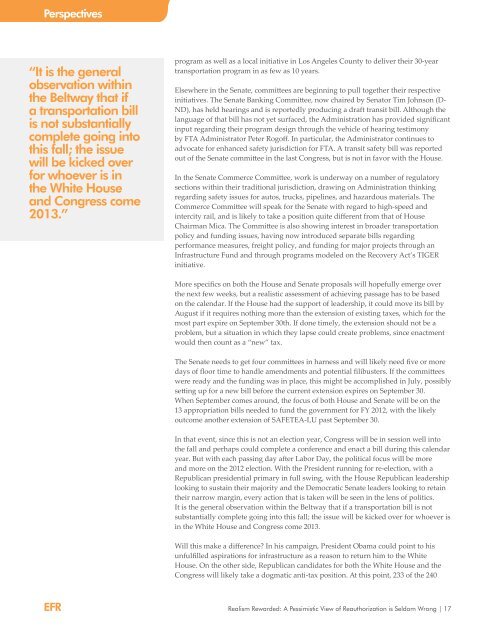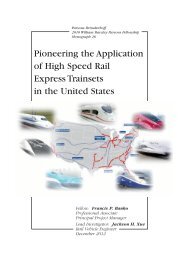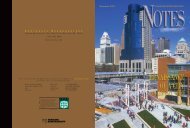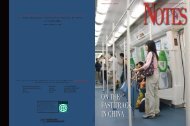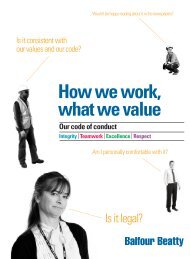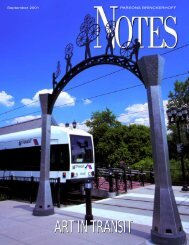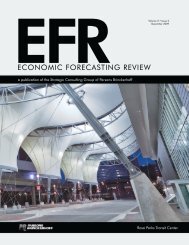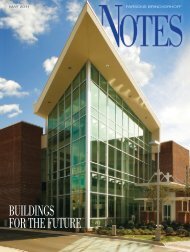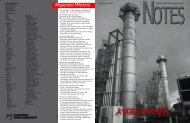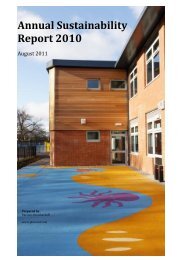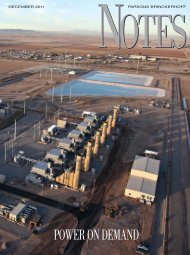June 2011 - Parsons Brinckerhoff
June 2011 - Parsons Brinckerhoff
June 2011 - Parsons Brinckerhoff
Create successful ePaper yourself
Turn your PDF publications into a flip-book with our unique Google optimized e-Paper software.
Perspectives<br />
“It is the general<br />
observation within<br />
the Beltway that if<br />
a transportation bill<br />
is not substantially<br />
complete going into<br />
this fall; the issue<br />
will be kicked over<br />
for whoever is in<br />
the White House<br />
and Congress come<br />
2013.”<br />
program as well as a local initiative in Los Angeles County to deliver their 30-year<br />
transportation program in as few as 10 years.<br />
Elsewhere in the Senate, committees are beginning to pull together their respective<br />
initiatives. The Senate Banking Committee, now chaired by Senator Tim Johnson (D-<br />
ND), has held hearings and is reportedly producing a draft transit bill. Although the<br />
language of that bill has not yet surfaced, the Administration has provided significant<br />
input regarding their program design through the vehicle of hearing testimony<br />
by FTA Administrator Peter Rogoff. In particular, the Administrator continues to<br />
advocate for enhanced safety jurisdiction for FTA. A transit safety bill was reported<br />
out of the Senate committee in the last Congress, but is not in favor with the House.<br />
In the Senate Commerce Committee, work is underway on a number of regulatory<br />
sections within their traditional jurisdiction, drawing on Administration thinking<br />
regarding safety issues for autos, trucks, pipelines, and hazardous materials. The<br />
Commerce Committee will speak for the Senate with regard to high-speed and<br />
intercity rail, and is likely to take a position quite different from that of House<br />
Chairman Mica. The Committee is also showing interest in broader transportation<br />
policy and funding issues, having now introduced separate bills regarding<br />
performance measures, freight policy, and funding for major projects through an<br />
Infrastructure Fund and through programs modeled on the Recovery Act’s TIGER<br />
initiative.<br />
More specifics on both the House and Senate proposals will hopefully emerge over<br />
the next few weeks, but a realistic assessment of achieving passage has to be based<br />
on the calendar. If the House had the support of leadership, it could move its bill by<br />
August if it requires nothing more than the extension of existing taxes, which for the<br />
most part expire on September 30th. If done timely, the extension should not be a<br />
problem, but a situation in which they lapse could create problems, since enactment<br />
would then count as a “new” tax.<br />
The Senate needs to get four committees in harness and will likely need five or more<br />
days of floor time to handle amendments and potential filibusters. If the committees<br />
were ready and the funding was in place, this might be accomplished in July, possibly<br />
setting up for a new bill before the current extension expires on September 30.<br />
When September comes around, the focus of both House and Senate will be on the<br />
13 appropriation bills needed to fund the government for FY 2012, with the likely<br />
outcome another extension of SAFETEA-LU past September 30.<br />
In that event, since this is not an election year, Congress will be in session well into<br />
the fall and perhaps could complete a conference and enact a bill during this calendar<br />
year. But with each passing day after Labor Day, the political focus will be more<br />
and more on the 2012 election. With the President running for re-election, with a<br />
Republican presidential primary in full swing, with the House Republican leadership<br />
looking to sustain their majority and the Democratic Senate leaders looking to retain<br />
their narrow margin, every action that is taken will be seen in the lens of politics.<br />
It is the general observation within the Beltway that if a transportation bill is not<br />
substantially complete going into this fall; the issue will be kicked over for whoever is<br />
in the White House and Congress come 2013.<br />
Will this make a difference? In his campaign, President Obama could point to his<br />
unfulfilled aspirations for infrastructure as a reason to return him to the White<br />
House. On the other side, Republican candidates for both the White House and the<br />
Congress will likely take a dogmatic anti-tax position. At this point, 233 of the 240<br />
EFR Realism Rewarded: A Pessimistic View of Reauthorization is Seldom Wrong | 17


